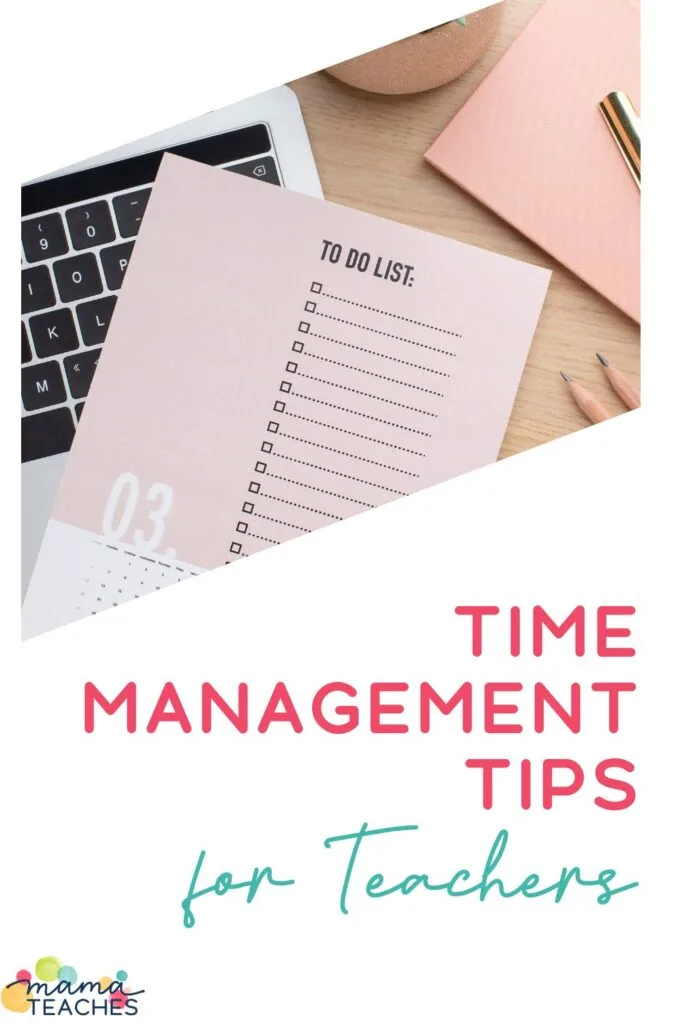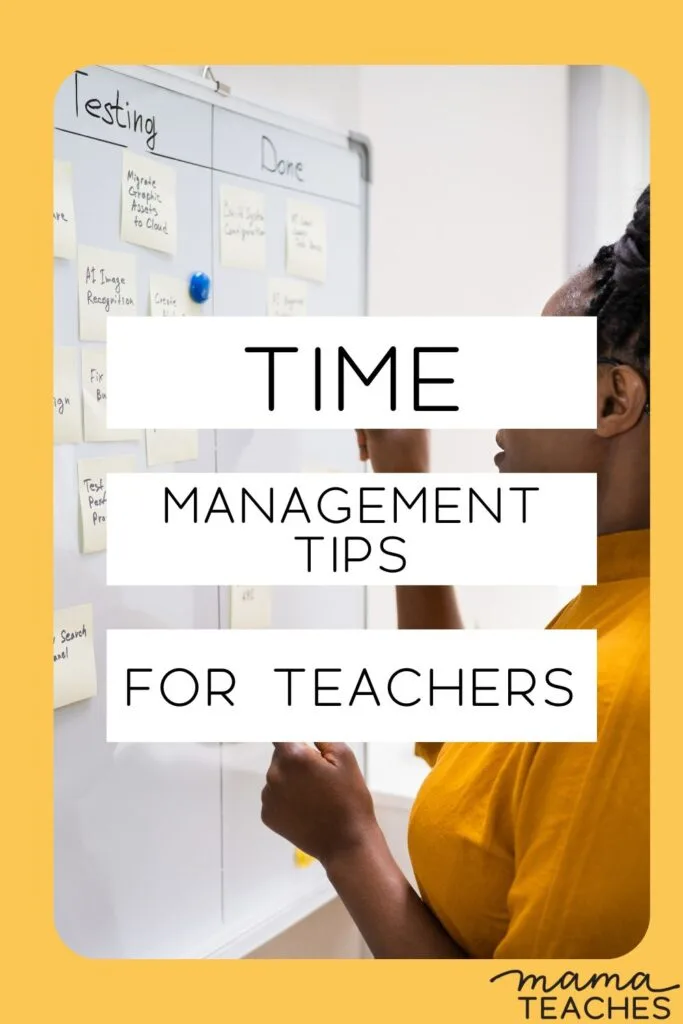Don’t let the clock get the best of you!
Learn how to spend your time wisely with these time management tips for teachers.

This article contains affiliate links to things that you might like.
How to Manage Your Time as a Teacher
As a teacher, your responsibilities could fill an ocean.
How do you take care of them without getting completely overwhelmed?
Time management is the name of the game.
Time management includes:
- Using efficient organizational systems
- Setting priorities
- Working within the allotted time limits
What does that look like practically?
Read on for some time management tips for teachers.

Tips To Help Teachers Manage Their Time
You will need to be savvy and disciplined in order to manage your time well.
Is it possible?
Absolutely!
Try these tips to help you manage your time (and cut your stress level in half!).
Keep a Running List
Here is a truth about teaching: There will always be more to do.
Don’t let this discourage you; let it free you!
You will likely never clear your desk of papers or remove all the items from your to-do list.
Your lesson plans will never be perfect, and your email inbox may never be 100% clear.
Once you accept that, you can focus your time on your priorities.
Sort through your daily to-do list.
Think about it in three categories:
- What must be done
- What should be done
- What would be nice to have done
If you tackle your list in that order, you can call it quits when you run out of your budgeted time.
You will have completed all of your “must-dos” and likely most of your “should-dos.”
That’s pretty good!

Divvy Up Your Weekly To-Dos
As a teacher, you have tasks that you must do every day.
These may include taking attendance, answering emails, organizing supplies and handouts, and making phone calls.
You also have a list of weekly tasks.
These include drawing up lesson plans, contacting parents, and grading.
If you are not careful, your weekly tasks will all get dumped onto Friday (and spill over into your weekend).
Manage your time by divvying up your weekly tasks over the course of the week.
For example, make your lesson plans on Monday and Tuesday, print your copies on Wednesday, write your class newsletter on Thursday, and meet with parents on Friday.
By dividing your weekly tasks across the week, you can save yourself from a weekend crunch.
Have a Set Start and End Time (and Don’t Take Work Home!)
You need to set boundaries for your time as a teacher.
Generally, your most productive time is before school begins.
If it is possible to get to work 30-60 minutes early, that is ideal.
Try to get to work at the same time each day.
Pick an end time for the day as well.
In most cases, 60 to 90 minutes after the kids leave should be plenty to finish your “must dos” and “should dos.”
You will be severely tempted to take work home.
Don’t do it!
Discipline yourself to work during your allotted time and not a minute over.

Have a Plan for Everything
Write your lesson plans.
Pencil in your to-do lists.
Sign up for your professional development courses and add them to the calendar.
Schedule the necessary meetings with parents and the administration.
Basically, invest in a teacher’s planner and actually use it.
You may think that going with the flow or winging it will save you time. It won’t.
You will still have to do all of the things mentioned, and you’ll be twice as stressed because they will be a surprise to you.
They will likely crop up at the most inopportune time.
Control your calendar; make a plan and stick to it.
Have a Place for Everything
If you don’t have systems in place, chaos will follow.
You will spend valuable time putting away supplies, sifting through papers, and scanning your cluttered inbox.
You can save yourself time by having systems in place.
Here are places where you can institute organizational systems:
- Student supplies (like scissors, coloring supplies, etc.)
- Email (use folders!)
- Attendance
- Collecting homework
- Tracking behavior
- Parent communication (like newsletters)
- Recording assessments and grades
- Cleaning the classroom (have a routine and ready-to-go supplies)

Work in Batches
You know this from teaching students: You can’t stay in productive mode 100% of the time.
You need breaks and achievable goals.
This means you need to work in batches.
Don’t say to yourself, “On Friday I am going to grade all my papers.” You will be much more efficient if you break your papers into smaller batches and complete a batch a day.
You will be much more focused and efficient; grading will take less time overall.
The batch system also helps you focus on one task at a time.
As much as we like to think of ourselves as multitaskers, we actually are more productive when we focus all our attention on a single task before moving on to the next.
Structure Your Day with What Matters
You also want to make effective use of your time in the classroom.
The goal of your class time is to help your students learn.
Don’t bulk up the day with extended practice.
Follow your instruction time with a few practice problems, but leave the rest of the practice for homework.
Distractions can quickly derail your day, so help your students focus by having effective classroom management strategies in place.
Know how to quickly command and retain your students’ attention with call-and-response, attention-getters at the start of your lessons, and an established morning routine.
In case you are tempted to remove all “downtime” from the school day, remember that students can only focus well for limited periods of time.
Hands-on activities and brain breaks can actually help your students be more productive overall.

Make Time for Yourself
Why are you reading about time management tips for teachers?
What will you do with the time you save?
Use it for yourself!
Teaching is a tiring job, and you need to take care of yourself.
You must make time for self-care.
You can take a bath or take a walk, make pasta or a playlist…whatever it is that feeds you, body and soul.
When you are rested and rejuvenated, you will be happier and more productive.
It’s a win-win.
Simple Time Management Tips for Teachers
As a teacher, you have constant demands on your time.
By having organizational systems in place, setting priorities of what to do, and working within set time limits you can make the most of your school day.
Your time is valuable, so manage it well.
(Then go home and put your feet up!)
You May Also Like:
- Class Control Tips for Teachers
- 21+ Things Teachers Can Do to Recharge
- Journaling to Help with Teacher Stress
